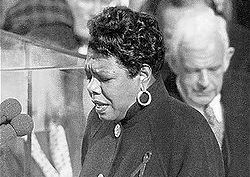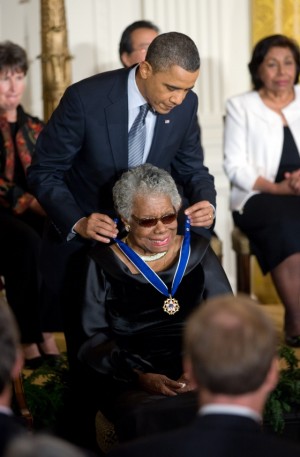Maya Angelou used words, her story to inspire the nation
February 27, 2015

IMAGE / The White House / Wikimedia Commons /
Ms. Maya Angelou reciting her poem “On the Pulse of Morning” at President Bill Clinton’s inauguration in 1993.
Maya Angelou was a poet, actress, director, playwright, author, civil rights activist, and a Grammy-winning composer.
Born Marguerite Annie Johnson on April 4, 1928, in St. Louis, Mo., the nickname Maya came from her older brother Bailey.
After her parents split up in 1931, Angelou and her brother were sent to live with their grandmother in Stamps, Ark.
Growing up in Arkansas, Angelou experienced a great deal of racism and discrimination. Children made fun of her for having kinky hair, dark skin, and being big for her age.
In 1936, Angelou was sent back to live with her mother in Chicago. Her mother’s boyfriend raped her and the only one she told about it was her brother.
Later, she had heard that her uncle killed her attacker. Since she believed her words killed a man, she went mute for almost five years. She then went back to live with her grandmother in Stamps.
In 1940, Angelou moved back in with her mother, but found it difficult because she felt like her mother treated her like a child. She later ran away to live with her dad, had the same problems that she did with her mom, and went back to her mother.
In her early teens, Angelou won a scholarship to the California Labor School to study dance and drama.
During this time, she became the first female cable car conductor in San Francisco.
She later returned to George Washington High School in San Francisco, graduating in 1944.
Angelou became pregnant during her senior year. Weeks after graduating, Angelou gave birth to her son, Guy.
In 1949, Angelou married Tosh Angelos, a Greek sailor. After divorcing him in 1952, she changed the Angelos name to Angelou and used her brother’s nickname for her, Maya, to create a new name.
In 1953, Angelou sang and danced at The Purple Onion, a night club in San Francisco, and she followed this up with touring in Europe with the opera Porgy and Bess.
Angelou also played a role in the civil rights movement during the 1960s.

President Barack Obama awards the 2010 Presidential Medal of Freedom to Dr. Maya Angelou in a ceremony in the East Room of the White House February 15, 2011.In 1964 while in Ghana, Angelou worked with the Organization of African American Unity, led by Malcom X, a black Muslim minister and human rights activist.
Angelou later worked with the Rev. Dr. Martin Luther King Jr., an American Baptist minister, activist, humanitarian, and leader in the civil rights movement.
This led to Angelou becoming the northern coordinator for the Southern Christian Leadership Conference at the request of King.
Her talents as an organizer raised money for the SCLC. She and some other actors produced the show “Cabaret for Freedom” in New York City in order to raise funds for the civil rights movement.
Angelou was a talented writer, and she was recognized for her skills.
She was fluent in many languages, including Arabic, Italian, French, Spanish, and Fante, a language of West Africa.
Angelou wrote an autobiography about her early years titled “I Know Why the Caged Bird Sings.” The book became an international bestseller and was nominated for a National Book Award in 1970.
Ms. Kari Shaw, English teacher, has taught this in her class.
“I wanted more diverse literature,” Shaw said. “I taught ‘I Know Why the Caged Birds Sings’ for years.”
Shaw said the book helped her understand a point of view different from her own.
“The book helped me understand the African-American experience. As a white woman who knew nothing about that, the closest thing I knew was to read about it,” Shaw said. “Maya Angelou’s writing really portrays the African-American experience.”
“I Know Why the Caged Birds Sings” was the first, and most famous, autobiography of her seven-volume autobiographical series, and it was the first ever to stay on the New York Times bestseller list for two years.
Angelou became the first black and first female inaugural poet in 1993 when she read her poem “On the Pulse of Morning” at President Bill Clinton’s inauguration.
In 2000, Angelou was awarded the National Medal of Arts by Clinton, and in 2010, she was awarded the Presidential Medal of Freedom, the highest civilian honor in the United States, by President Barack Obama.
Maya Angelou passed away May 28, 2014, at her home in Winston-Salem, N.C., at the age of 86.
Mr. Jared Rawls, English teacher, studied Angelou’s work in college. Rawls said Angelou teaches lessons.
“Maya Angelou showed a lot of resilience, courage, and strength during a time when it was hard to be an African American through her poetry,” Rawls said. “She taught me how to deal with difficult times. She is a great example on how to deal with adversity you have experienced in your life.”
Shaw said Angelou’s legacy will carry on because of how powerful her voice was.
“She is one of the most significant African-American writers of the century, and she has been one of the biggest voices of African-American experience for the past 50 years,” Shaw said.
BLACK HISTORY MONTH SERIES: This is the fifth story in a series of five stories written by The Eclipse in honor of Black History Month.